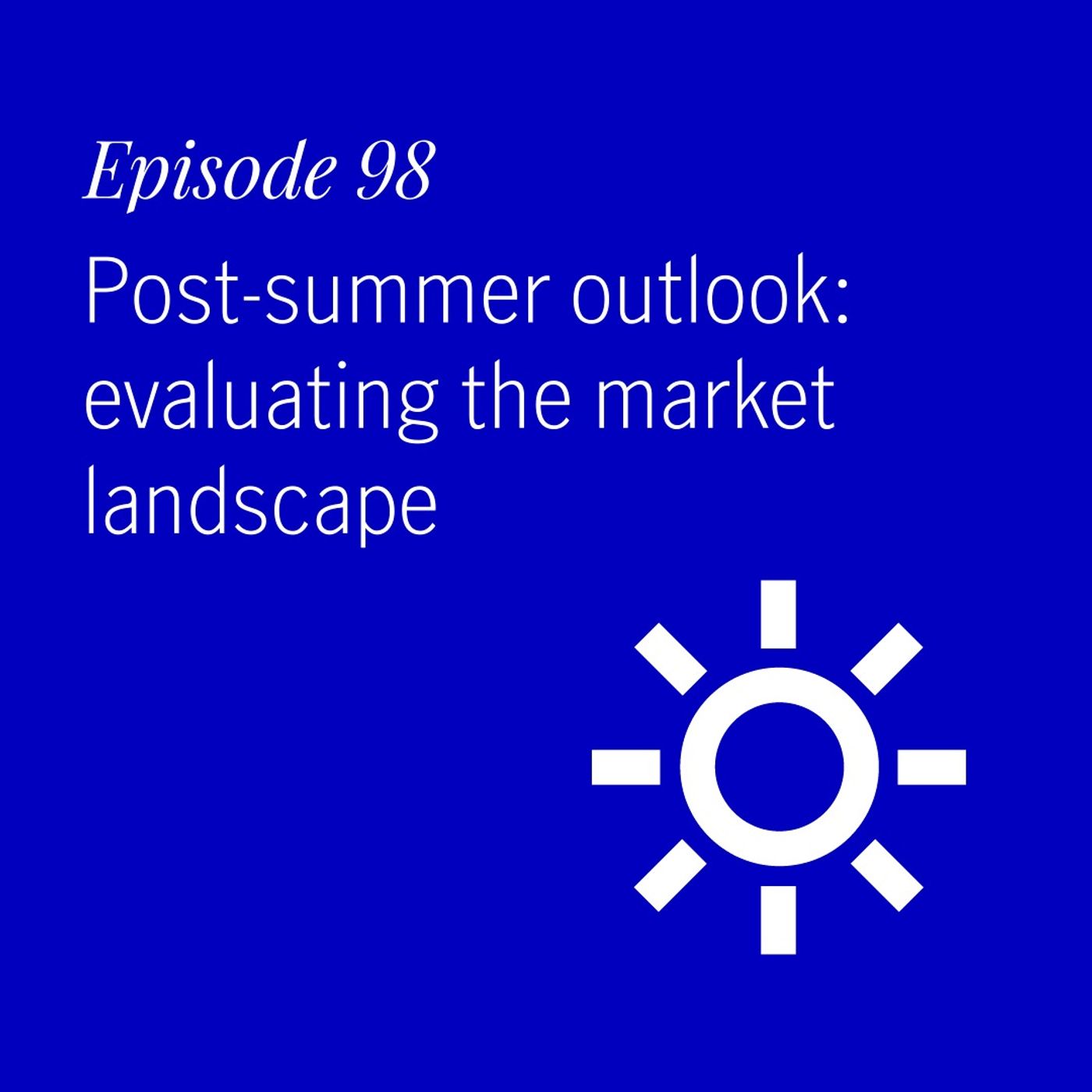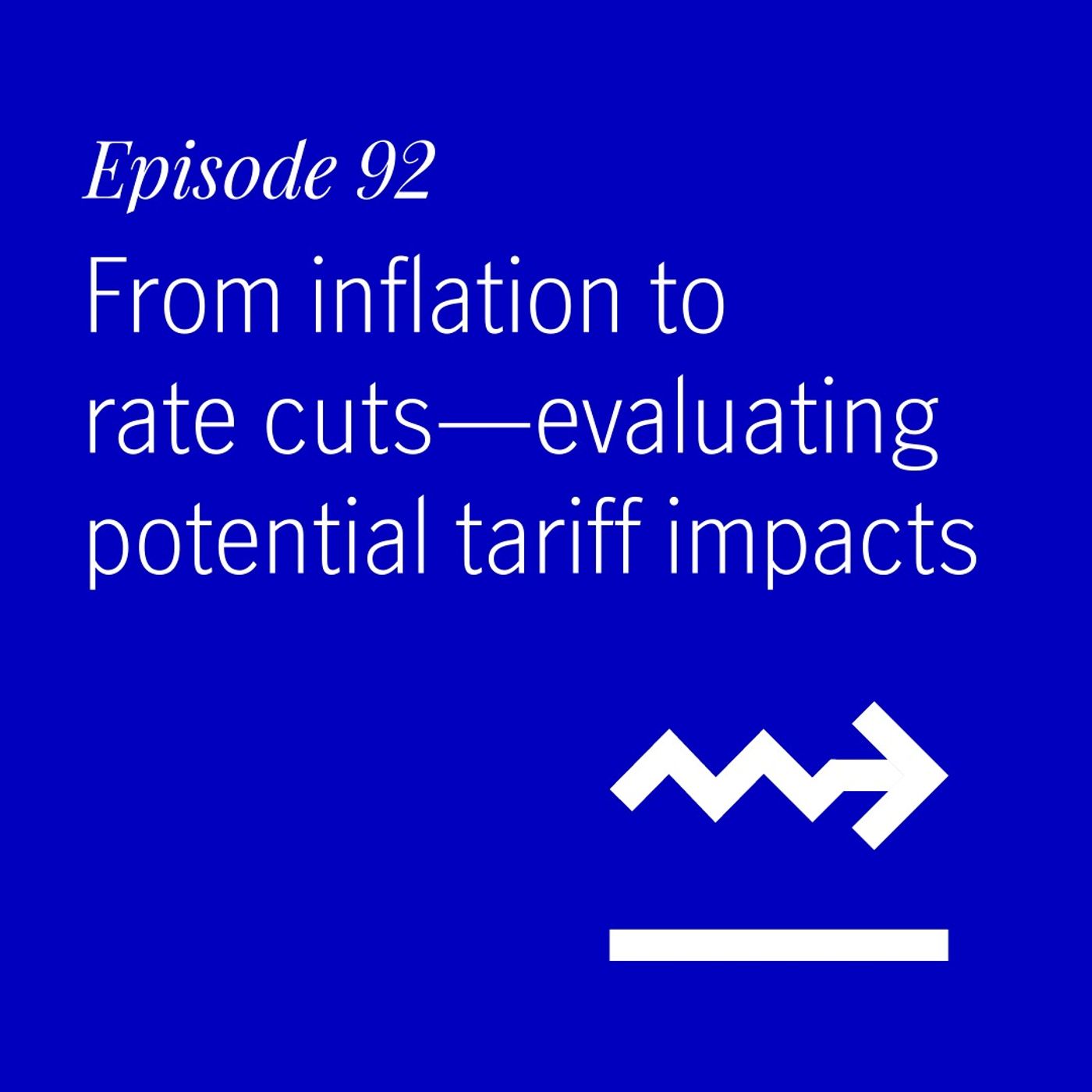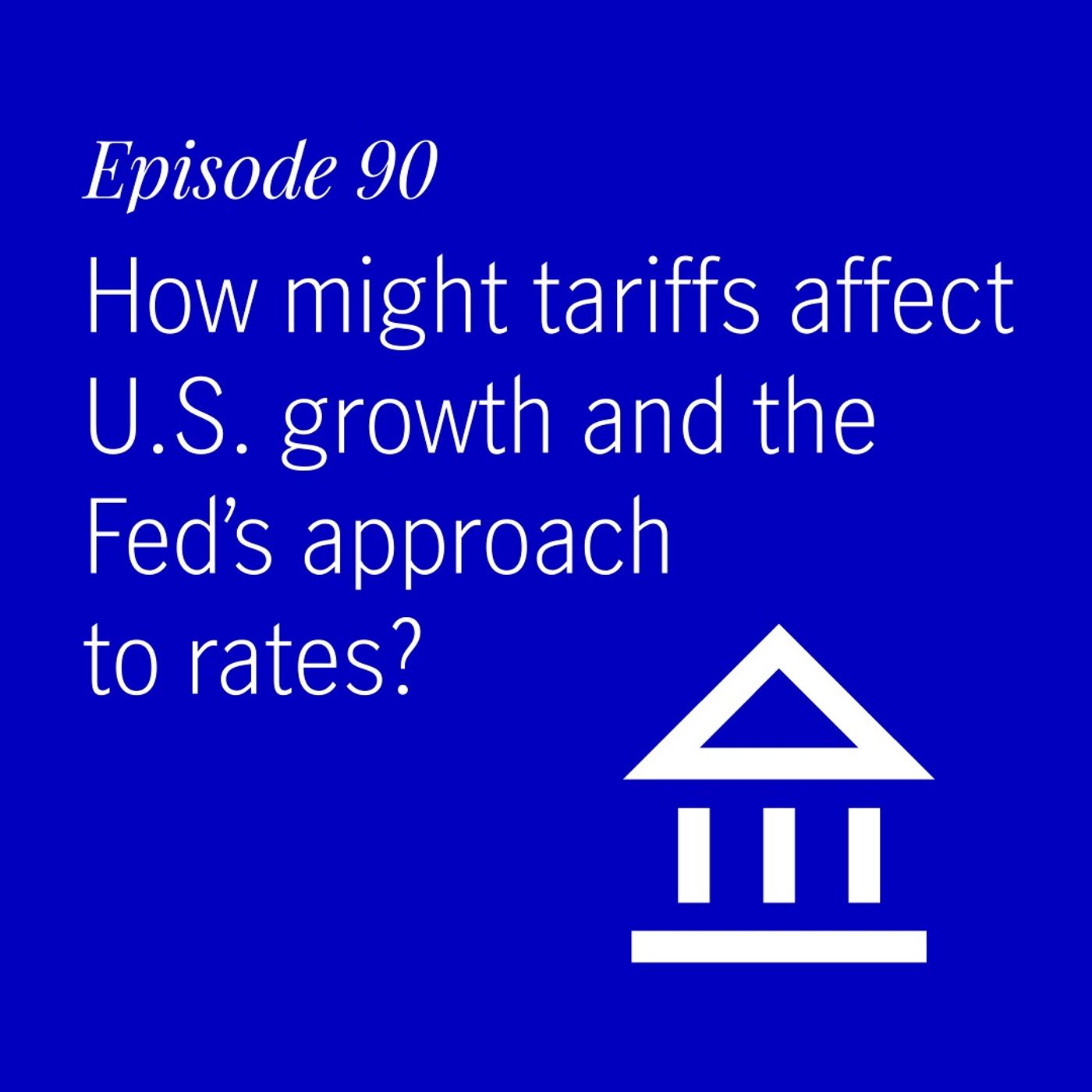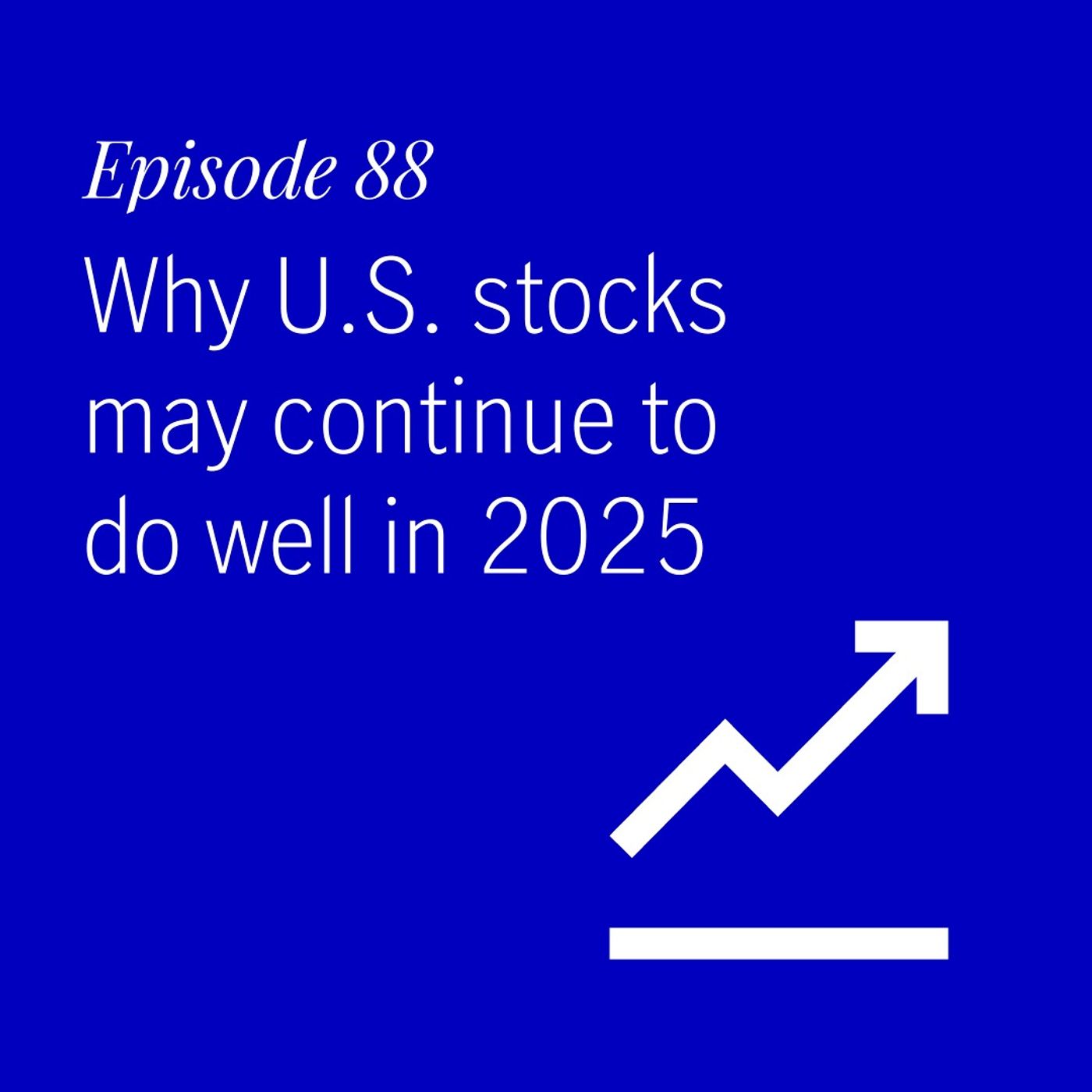Discover Portfolio Intelligence Podcast
Portfolio Intelligence Podcast

Portfolio Intelligence Podcast
Author: Manulife John Hancock Investments
Subscribed: 21Played: 202Subscribe
Share
Description
Portfolio Intelligence Podcast with John Bryson, head of investment consulting at Manulife John Hancock Investment Management, features interviews with asset allocation experts, portfolio construction specialists, and investment veterans from across Manulife John Hancock’s multimanager network. The dynamic discussion explores ideas advisors can use today to build their business while helping their clients pursue better investment outcomes.
105 Episodes
Reverse
As the investment landscape continues to evolve, alternative investments are playing a larger role in portfolio construction. In this episode, host John Bryson talks with Pattie about the factors driving increased interest in this segment.Pattie shares insight into the development of new product structures, advances in technology, and the expanding access to private markets. She also addresses how the industry is responding to investor demand through innovation.1 What are alternative investments?Pattie: Alternative investments are nontraditional assets outside of stocks and bonds, such as private equity, private credit, hedge funds, and real assets. They’re typically less liquid, more complex and are structured to enhance risk/return profiles. They generally provide diversification and increased income. These differ from liquid alternatives, such as long/short equity, market neutral, managed futures, and more derivative-related strategies.2 What investor needs do alternative investments address?Pattie: Alternative investments are designed to meet investor needs and market gaps that traditional stocks and bonds may not. They provide diversification, which helps reduce portfolio concentration risk, as well as inflation protection. They also offer higher return potential through access to unique private market opportunities. Lastly, the illiquidity premium is a key feature, which is the price paid for additional returns in exchange for locking up capital for longer.3 What’s the future of alternative investment product development?Pattie: In one word: democratization. We’ll see increased retail access to private markets, technology-driven distribution, tokenization, blockchain for settlement and customization. We’ll also see the emergence of alternative model portfolios that blend private and public assets. The industry is also focusing on innovations in liquidity and evolving fee structures.
2025 was a year unlike any other, with politics and sentiment driving markets more than fundamentals. In this episode, host John Bryson welcomes Matt and Emily to share their views on what shaped the year and how they’re thinking about portfolio positioning for 2026.Matt and Emily discuss why they’re taking a “drafting the market” approach, i.e., remaining fully invested, with a focus on managing risk. They explore the importance of targeting income and diversification, share their outlook on interest rates and sector dynamics, and provide practical ideas for building resilient portfolios in the year ahead.1 Which sectors and trends stood out in 2025, and what do you expect for 2026?Emily: Market leadership broadened in 2025. Tech and communication services stayed in the lead, but industrials, financials, and healthcare also saw strong returns. Momentum was the top-performing factor. Heading into 2026, we’re looking to redeploy assets into high-quality stocks and bonds, especially as yields remain attractive. We think it’s a good time to move some cash sitting in money market funds into a diversified mix of high-quality bonds and stocks.2 What are the top themes investors should focus on as they position portfolios for 2026?Matt: The first theme is income. After years of strong equity returns, it’s getting harder to sustain those gains. There are a lot of income opportunities, with the U.S. bond market providing attractive yields. As interest rates fall, we think investors shouldn't wait too long to allocate capital to lock in these yields.Additionally, investors can look for ways to boost return potential outside U.S. tech—consider mid and small caps. With international stocks looking expensive, we’re focused on finding areas with good quality earnings growth, such as industrials and healthcare. But above all, income remains our top focus for 2026.
Medicare is a cornerstone of retirement planning, but its complexity can leave many retirees feeling overwhelmed. In this episode, host John Bryson, head of investment consulting, investment data analytics, and education savings at Manulife John Hancock Investments, welcomes Danielle to break down the Medicare essentials you need to know for 2026 and beyond.Danielle, author of the book 10 Costly Medicare Mistakes You Can’t Afford to Make, discusses the latest expected changes to Medicare. She emphasizes the importance of early research and understanding the difference between supplemental plans, such as Medicare Advantage plans and Medicare Supplement Insurance (Medigap). She also offers strategies to help avoid higher Income-Related Monthly Adjustment Amount (IRMAA) surcharges.Here’s a snippet from the conversation:1 What changes are expected to Medicare in 2026?Danielle: While we don’t have some Medicare figures due to the government shutdown, we can expect Part B premiums to increase a bit. Projections suggest they could rise to $206 next year. Another major change stems from the Inflation Reduction Act of 2022, which led several carriers to exit the Part D market. As a result, about 2 million people are likely to lose their Medicare Advantage plans. If you’ve received a notice that your plan is exiting the market, it’s important to shop for a new plan promptly to ensure you have coverage in place for January 1.2 What’s IRMAA and how does it affect Medicare costs?Danielle: IRMAA is a surcharge on Medicare Part B and Part D, based on your income. While the base rate in 2025 is $185, an IRMAA surcharge will increase that amount. As a result, Part B premiums for people in really high-income brackets can increase to over $600 per month. So, decisions you make at ages 63 and 64 can affect your Medicare premiums at 65 and 66. It’s wise to work with your financial advisor to plan ahead to explore spreading out income or avoiding large distributions that may help prevent higher premiums later.
After a year marked by early uncertainty and underperformance, the municipal bond market has rallied, offering investors attractive yields and renewed opportunity as 2025 draws to a close. In this episode, host John P. Bryson welcomes Adam for a timely discussion on what’s driving performance in the municipal bond market. Adam shares his perspective on how supply dynamics, investor flows, and sector trends are shaping the market. He also discusses why entry points matter and how active management can add value in today’s environment. Here’s a sneak peek into the conversation: Why should investors have tax-free municipal bonds in their portfolio?Adam: Municipal bonds work well for investors who are looking for tax-free income. Adding stability to your portfolio using municipal bonds helps offset the volatility of equity holdings. Especially when it may seem like we’re heading toward a slowdown, these instruments tend to perform slightly better than other fixed-income instruments. Municipal bonds help provide a long-term income stream for investors.What have been the major developments in the municipal bond market in 2025?Adam: We started the year with weak performance, with municipal bonds underperforming corporates and Treasuries. There was an excess supply, over and above what we saw in 2024. This was driven by delayed infrastructure projects, which finally got funded, and costs went up. In the past two to three months, flows have improved, and returns are looking solid. Supply and demand have lined up. We expect solid returns in November and December, with good flows and lower supply offering support. What are the biggest opportunities in the municipal bond market today?Adam: The municipal bond market is generally offering attractive yield levels currently. We like the intermediate to long space because the curve is steep and income is high, but we’re avoid going too long due to volatility. Credit spreads within the municipal bond market have widened, so there’s room for tightening. Lastly, we also see value in bonds subject to Alternative Minimum Tax, low-coupon bonds, and sectors like airports, which tend to issue at wider spreads and have strong fundamentals.
As the economic landscape grows more complex, investors and advisors are facing new questions about growth, inflation, and what the U.S. Federal Reserve (Fed) may do next. In this episode, host John P. Bryson is joined by Matt and Emily, who discuss the strength of theongoing market rally, recent volatility in the banking sector, the bond market, and rate-cut expectations. They emphasize thoughtful allocation, diversification, and a focus on quality as advisors position portfolios in a momentum-driven environment.Below are a few highlights from the episode:1 How is U.S. economic data shaping up currently?Emily: Economic data is complicated right now. The latest small business survey by the National Federation of Independent Business showed a deterioration in sentiment. Manufacturing data is split, the Fed showed mixed messages, and job openings are decelerating. It's difficult to get a read right now given the lack of economic data due to the government shutdown. Overall, the U.S. economy is continuing to see a slow deceleration.2 What is the bond market telling us about possible Fed rate cuts?Emily: Credit markets are stable, with high-yield spreads below 3.0%, suggesting no broad stress. The two-year Treasury yield, which has broken below 3.5%, indicates the Fed may need to cut rates more than previously expected. Inflation is also likely to slow more than official data suggests. Labor market softness and real-time housing data showing falling prices are leading us to expect the Fed to cut a bit more, we think potentially four or five cuts into 2026.3 What are your conversations with advisors and investors focused on right now?Matt: While the recent rally has been remarkable, the question is if it’s sustainable. Our focus is on how to continue allocating capital for appreciation for clients, but in a thoughtful way, which is why we’re discussing diversification. We’ve talked about alternatives like infrastructure-related equities and multi-alternative strategies, as well as mid-cap equities to reduce concentration risk in large-cap U.S. stocks. On the bond side, you can still get good income for clients where you can liability match and use this income for spending needs over the coming years—so it makes sense to take advantage while it lasts.
In a twist for the 100th episode of the Portfolio Intelligence podcast, the roles are reversed as Justin Clarke, CRPC, senior vice president, takes over duties to interview the series’ regular host, John Bryson, head of investment consulting.Since the podcast’s inception in 2020, John has been steering listeners through a myriad of market and investment views through insightful conversations with industry experts and investment veterans from across Manulife John Hancock’s multimanager network.In this celebratory episode, John reflects on the podcast's beginnings during a volatile market period, its evolution, and the pivotal topics and guests that have shaped its growth into a vital resource for advisors.
The landscape of college funding has shifted with the passage of OBBBA. As families prepare for future education costs, understanding these changes becomes crucial.In this episode, Mark joins podcast host John P. Bryson to unpack the details of this comprehensive legislation. He delves into how OBBBA affects federal student loan programs, Pell Grants, and college savings plans. Here’s a brief Q&A with key takeaways from their conversation:1 What major changes did OBBBA make to federal student loan programs?Mark: OBBBA repealed the Grad PLUS loan program, retained the Parent PLUS loan program with new annual and aggregate loan limits, and also introduced new loan limits for graduate and professional school students. It also streamlined repayment plans to just two options—a standard repayment plan and an income-based repayment assistance plan.2 How does OBBBA affect federal grants like the Pell Grant?Mark: Students with low income but high assets or those with nonfederal grants exceeding the total cost of attendance are now ineligible for the Pell Grant. OBBBA also introduced workforce Pell Grants for short-term programs and added the option to add foreign earned income to adjusted gross income for determining eligibility.3 What changes does OBBBA bring to education savings accounts?Mark: For K-12 education, OBBBA expanded qualified expenses for 529 education savings accounts and increased the annual limit of qualified expenses that families can draw from $10,000 to $20,000, starting in the 2026 tax year. It allowed rollovers from 529 education savings plans to ABLE accounts for the disabled and increased the lifetime estate and gift tax exclusion permanently. It also introduced Trump Accounts with a $1,000 federal contribution for children born between 2025 and 2028 and allowed annual employer and parental contributions.
With fresh economic data and anticipated interest rate cuts from the U.S. Federal Reserve, the market has a lot to look forward to as the back-to-school season ushers in a time of renewed focus. In this episode, host John Bryson sits down with Matt and Emily for a timely check-in as summer draws to a close.They delve into the recent uptick in global Purchasing Managers’ Index (PMI) readings and how it might signal shifts in market sentiment. They also explore the current phase of U.S. earnings growth and discuss their strategies for stocks and bonds in the current market landscape. Here’s a glimpse into the conversation.1 What opportunities do you see in bonds and equities?Emily: We favor high-quality bonds like investment-grade corporates, mortgage-backed securities, and municipal bonds due to elevated yields and potential duration benefits. In stocks, we think it’s time to shift from riskier market segments to high-quality stocks. We are focusing on sectors like technology, communication services, and industrials, emphasizing companies with strong returns on equity and reasonable PEG ratios.2 How do you view the current phase of the market cycle with regard to U.S. earnings?Matt: Earnings growth will have to remain the key driver of equity returns as dividend yields are low and P/E ratios are high. S&P 500 Index earnings have exceeded expectations, but Q3 and Q4 earnings performance will be crucial to watch. Ultimately, we think strong earnings are the best thing this market's got going for itself.3 How do you interpret the recent bounce in global PMI, especially for U.S. manufacturing and services?Emily: Global PMI showed a reacceleration in growth in August. The U.S. manufacturing PMI at 53.3 was the highest reading of the year. U.S. services also performed well. United States is showing better relative growth compared to Europe, leading us to favor U.S. equities.
Understanding the nuances of private and public fixed-income portfolios is crucial for advisors to deliver effective outcomes for clients. Our Head of Investment Product Management Matthew C. Hammer, CRPC, discusses strategies for crafting resilient fixed-income portfolios.
With the Social Security Fairness Act now in effect, significant changes are under way for retirement benefits. In a conversation with podcast host John P. Bryson, Brooke delves into the implications of eliminating the Windfall Elimination Provision (WEP) and the Government Pension Offset (GPO) and what the changes mean for current and future retirees. Here’s a glimpse into the conversation.1 What is the Social Security Fairness Act?Brooke: The Social Security Fairness Act of 2025 repealed two controversial provisions that were a part of Social Security: the WEP and GPO. The Fairness Act was signed into law on January 5, 2025, by former U.S. President Joe Biden. Although it was signed into law in 2025, it is retroactive to January 1, 2024.2 What happens now that WEP and GPO have been eliminated?Brooke: Since these provisions were repealed, Social Security has been making one-time retroactive payments to individuals who previously received lower benefits. These payments cover amounts due from January 2024 to February 2025. Starting in April 2025, ongoing payments should reflect the new, higher amounts. However, it may take until November 2025 to fully process all retroactive payments.3 Who benefits from the Social Security Fairness Act?Brooke: Between three to four million people are affected by this change. This primarily affects individuals in a few states such as Texas, California, Massachusetts, Colorado, Ohio, Louisiana, Georgia, and Illinois.
Active ETFs are gaining traction as a tool for alpha generation, while the potential for an ETF share class has come to the forefront in the past few months. Steve discusses considerations for investors looking to incorporate these investment options into their portfolios in this episode with podcast host John P. Bryson. Here’s an excerpt from the conversation:1 What are active ETFs?Steve: An active ETF combines the ETF wrapper with active management inside of a 40 Act product like a mutual fund, but in this case, the 40 Act product is the exchange-traded fund. It allows for intraday trading, transparency of underlying holdings, and tax efficiency, with the potential to outperform a market or a benchmark.2 What should investors consider while picking an active ETF that’s right for them?Steve: Investors should consider the track record and trustworthiness of the active manager, understanding what the fund aims to accomplish. They should consider the underlying investments within the ETF and how that relates to pricing. There's always a spread, like when you buy a stock, so you want to understand how wide the spread is, your cost of acquisition, and if you have to pay a commission.3 What is an ETF share class?Steve: An ETF share class is an additional share class of a traditional mutual fund, similar to an A or I share class, but in an ETF wrapper. It allows for an ETF to be linked to an already established mutual fund with a track record, offering benefits like instant scale and historical performance. This setup can provide lower overall expenses and more tax efficiency due to the structure of ETFs.1 “ETFs 2029: The path to $30 trillion,” PwC, 3/4/25 .
Whether we’re considering domestic or international equities, market movements and valuations seem to be reflecting sentiments rather than underlying fundamentals. Moving into the second half of 2025, it’s crucial to look beyond inflated valuations and seek pockets of opportunity that offer both value and quality.In this episode, Matt and Emily talk to podcast host John P. Bryson about how investors can navigate today’s volatile market even as economic slowdown worries persist. Here’s a sneak peek into the conversation.1 What’s U.S. economic data indicating?Matt: The employment picture is still holding up okay, with monthly job gains of about 150,000. Initial jobless claims have come up a little bit but are still at a low level historically. Overall, it’s not amazing growth, but it's not too slow either. It seems like no one's appreciating the slowdown in inflation, but the data’s showing it. In our view, some of the current market movements may have rotation or opportunities presenting themselves because the U.S. economy's holding up all right.2 How is the bond market reacting to U.S. economic data?Emily: Bonds aren't getting the memo as it relates to the macro backdrop. Normally, you would think that bond yields would be falling meaningfully as inflation comes down. We're not really seeing that. We're sort of chopping around in the 4.50%-ish range.Housing, for example, is a critical component of the Consumer Price Index (CPI). There is a lot more housing supply coming online, and that is bringing inflation to the lowest level since 2021.1 That's a really notable dynamic that is just not being picked up by the bond market right now.3 What should investors focus on for the second half of 2025?Emily: We want to be careful about chasing risk here. We need to think about where we can find value. Where can we find the best earnings growth on a relative basis? Where can we find parts of the market that are on sale? We want to be careful about not getting pushed into momentum-driven areas of markets that are just rallying on sentiment.1 U.S. Bureau of Labor Statistics.
The college admissions process can be incredibly competitive and stressful―intense strategizing is required. The lack of clarity around the role that standardized admissions tests such as the SAT and ACT play in the process doesn’t help. College admissions coach Nancy Steenson joins podcast host John Bryson on how best to navigate the evolving college admissions environment.
Spring, they say, can really hang you up the most―and that’s the tune that’s played out in the markets so far, in the wake of Liberation Day. Might the proposed tariffs lead to a recession? How should investors position their portfolios amid uncertainty? Take a listen to what Matthew D. Miskin, CFA, our co-chief investment strategist, has to say.
For many of us, the word “investor” tends to be closely associated with the male gender. This may need to change soon because women are on track to control 38% of investable wealth by 2030. Our Director of Practice Management, Kathleen Pritchard, and Divisional Sales Manager, Megan Hopps, explain why it’s time for the industry to reframe the way it approaches women and wealth.
Tariffs―a topic that’s dominated many conversations in recent days, and likely, for many more to come. Alex Grassino, global chief economist at Manulife Investment Management, joins podcast host John P. Bryson to explore how tariffs can affect the way businesses and consumers think about their decisions. Alex also explains why the relationship between tariffs and inflation may not be as straightforward as it seems.
Markets started the year on a slightly uneven footing as issues such as stock-price valuation, tariffs, and U.S. interest rates weighed on sentiment. While our Co-Chief Investment Strategists Emily R. Roland, CIMA, and Matthew D. Miskin, CFA, think compelling investing opportunities can still be found, they feel that it may be time for investors to adjust their expectations.
A new year typically ushers in new hopes. Where Wall Street’s concerned, 2025 may well ring in new highs. Emory W. (Sandy) Sanders, Jr., CFA, Senior Portfolio Manager at Manulife Investment Management shares his investment approach with podcast host, John P. Bryson, and explains why he’s feeling sanguine about the coming year.
After an initial burst of euphoria following the election, investors appear to have adopted a more cautious mood as they assess how the incoming administration might shape financial markets. Our Co-Chief Investment Strategists Emily R. Roland, CIMA, and Matthew D. Miskin, CFA, share their views.
Danielle K. Roberts, co-founding partner of the insurance agency Boomer Benefits, joins podcast host John P. Bryson to discuss what today’s retirees and near-retirees need to know about Medicare and how to factor healthcare costs into their overall financial plans and decision-making. Danielle, author of the book 10 Costly Medicare Mistakes You Can’t Afford to Make, outlines the different parts of Medicare coverage and explores key considerations in choosing between Medicare Advantage and Medigap coverage. She also offers advice to help investment professionals assist clients who are trying to adapt to recent and pending changes to the federal program.
























